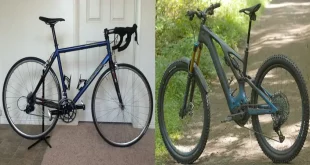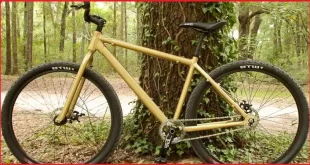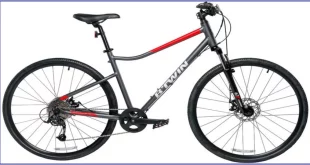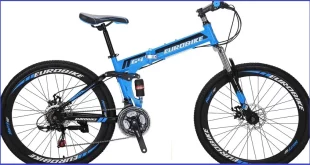Mountain bikes are a great option for commuting, providing a reliable and versatile mode of transportation to confidently navigate urban environments. Choosing the right bike for commuting can greatly impact your overall experience and satisfaction.
While there are various types of bikes available, mountain bikes have proven to be an excellent choice for those looking to commute with confidence. With their sturdy build and versatile features, mountain bikes provide a reliable means of transportation in urban environments.
Whether you encounter rough roads, potholes, or curbs, mountain bikes can handle the challenges of commuting, ensuring a smooth and comfortable ride. In addition, their wide tires offer enhanced stability and grip, minimizing the risk of accidents. Moreover, mountain bikes often come equipped with features such as suspension and disc brakes, providing additional safety and control. With these advantages, it’s clear that mountain bikes are a good option for those seeking a practical and reliable mode of transportation while commuting.
Benefits Of Mountain Bikes For Commuting
Are mountain bikes suitable for commuting? Absolutely! If you’re tired of being stuck in traffic or looking to add a little adventure to your daily commute, a mountain bike could be the perfect solution. With their durability, versatility, comfort, speed, and enhanced safety features, mountain bikes offer several benefits for those who choose to cycle to work.
Let’s explore these advantages in more detail:
Durability: Rugged Construction For Urban Obstacles
- Mountain bikes are built to withstand rough terrain and urban obstacles commonly encountered during a commute, such as potholes, curbs, and uneven pavement.
- The robust frame and sturdy components ensure that your bike can handle the daily wear and tear of city streets, providing long-lasting performance and reliability.
- With a mountain bike, you can confidently navigate through crowded streets without worrying about damaging your bike or compromising its functionality.
Versatility: Handle Various Terrain And Weather Conditions
- One of the biggest advantages of using a mountain bike for commuting is its ability to handle diverse terrain and weather conditions effortlessly.
- Whether you encounter gravel paths, muddy roads, or even snowy streets, a mountain bike’s wider tires with better traction and suspension system can conquer these challenges.
- With a mountain bike, you can seamlessly transition from paved roads to off-road shortcuts, opening up a multitude of route options for your daily commute.
Comfort: Ergonomic Design For A Smooth Ride
- Mountain bikes are designed with ergonomics in mind, offering features that maximize comfort during your daily commute.
- The suspension system absorbs shocks and vibrations, providing a smoother ride and reducing the impact on your body.
- The wider handlebars and upright riding position promote better posture and reduce strain on your back, ensuring a more enjoyable and pain-free cycling experience.
Speed: Efficient Gears For Faster Commuting
- Mountain bikes are equipped with a wide range of gears, allowing for faster acceleration and higher speeds during your commute.
- The gear ratio options on mountain bikes enable you to adjust your pedaling effort to match the terrain, enabling efficient riding and reducing fatigue.
- With a mountain bike’s efficient gearing system, you can reach your destination faster, saving you time and making your commute more efficient.
Safety: Enhanced Control And Stability On The Road
- Mountain bikes provide enhanced control and stability on the road, thanks to their wider tires, robust frame, and reliable braking systems.
- The wider tires offer better traction on various surfaces, ensuring a grip on wet roads and minimizing the risk of skidding.
- The sturdy frame and disc brakes provide reliable stopping power, ensuring that you can react quickly and confidently in any situation, further enhancing your safety while commuting.
So, if you’re looking for a reliable, versatile, and comfortable option for your daily commute, consider a mountain bike. With their durability, versatility, comfort, speed, and enhanced safety features, mountain bikes can transform your ordinary commute into a thrilling adventure while ensuring a reliable and efficient means of transportation.
Hop on a mountain bike and commute with confidence.
Choosing The Right Mountain Bike For Commuting
Mountain bikes may not be the first thing that comes to mind when thinking about commuting to work or running errands around town. However, they can actually be a great option for getting around in urban environments. With their rugged build and versatility, mountain bikes can handle the demands of city streets while providing a comfortable and enjoyable ride.
But with so many options available, how do you choose the right mountain bike for commuting? Let’s explore some key factors to consider when making your decision:
Frame Material: Aluminum, Steel, Or Carbon Fiber?
- Aluminum: Lightweight and affordable, aluminum frames offer a good balance of durability and performance for commuting.
- Steel: Known for its strength and resilience, steel frames provide a smooth and comfortable ride but can be heavier than other materials.
- Carbon fiber: The lightest and most expensive option, carbon fiber frames offer excellent vibration dampening and a high level of performance, making them ideal for long-distance commuting.
Suspension Type: Hardtail Or Full Suspension?
- Hardtail: With suspension only in the front fork, hardtail mountain bikes are lightweight and efficient for urban commuting, providing a responsive ride on rough roads.
- Full suspension: Equipped with front and rear suspension, full suspension bikes offer maximum comfort and control, making them suitable for riders dealing with bumpy terrain or longer commutes.
Tire Size: Finding The Right Balance For Urban Commuting
- Narrower tires: These tires are optimal for riding on pavement, providing less rolling resistance and increased speed on city streets.
- Wider tires: Offering more traction and stability, wider tires can handle rough roads or uneven surfaces commonly found in urban environments.
Gearing: Single-Speed Or Multi-Speed?
- Single-speed: Simple and low-maintenance, single-speed mountain bikes are great for shorter commutes on relatively flat terrain.
- Multi-speed: With a range of gears, multi-speed bikes allow you to easily tackle different inclines and speeds, making them suitable for longer or more challenging commutes.
Accessories: Essential Features For City Riding
- Fenders: Keep yourself clean and dry by attaching fenders to your bike, preventing mud splashes during rainy rides.
- Lights: Ensure visibility and safety by equipping your mountain bike with front and rear lights, especially if you commute early in the morning or after sunset.
- Rack and panniers: Carry your belongings conveniently by installing a rack and panniers, allowing you to transport items without adding strain to your body.
When choosing a mountain bike for commuting, consider your specific needs and the conditions of your daily route. Whether it’s a lightweight aluminum frame, a hardtail with responsive handling, narrower tires for increased speed, or the convenience of added accessories, finding the right mountain bike can make your commute both efficient and enjoyable.
So, why not hop on a mountain bike and ride with confidence to your destination?
Tips For Commuting With Mountain Bikes
Planning The Route: Utilizing Bike-Friendly Paths And Lanes
When it comes to commuting with mountain bikes, planning your route is crucial for a smooth and enjoyable journey. By utilizing bike-friendly paths and lanes, you can minimize the risk of accidents, avoid heavy traffic, and reach your destination in a timely manner.
Consider the following key points:
- Research bike-friendly routes: Look for designated bike paths, greenways, and cycle lanes in your area. These routes are specifically designed to accommodate cyclists and ensure a safer commute.
- Utilize bike maps: Local authorities often provide bike maps that outline bike-friendly routes. Take advantage of these resources to plan your journey effectively and discover the most convenient paths.
- Consider traffic patterns: Take note of peak traffic hours and try to choose alternative routes that have less congestion. This will not only save you time but also make your commute more enjoyable.
- Explore scenic options: Commuting doesn’t have to be boring! Look for paths that pass through parks, scenic areas, or along rivers to add some natural beauty to your journey.
Maintaining The Bike: Regular Check-Ups And Servicing
To ensure optimum performance and safety while commuting with your mountain bike, regular maintenance is essential. Here are some key points to keep in mind:
- Regularly check tire pressure: Properly inflated tires provide better control, traction, and comfort. Make it a habit to check your tire pressure before each commute.
- Inspect brakes and gears: Test your brakes to ensure they are responsive, and check your gears for any signs of wear or misalignment. Make adjustments as necessary or consult a professional bike shop for assistance.
- Keep the chain lubricated: Regularly lubricating your bike chain helps prevent rust and improves shifting. Use bike-specific lubricants for optimum performance.
- Check for loose parts: Prior to your commute, inspect your bike for loose bolts, nuts, or any other components that may need tightening. This will help avoid any sudden malfunctions during your ride.
- Schedule routine servicing: Consider taking your mountain bike to a professional bike shop for regular servicing. This will help identify any underlying issues and ensure your bike is in top condition for commuting.
Safety Precautions: Helmet, Lights, And Reflective Gear
When commuting with a mountain bike, prioritizing safety is of utmost importance. Here are some key safety precautions to consider:
- Wear a helmet: Always wear a well-fitting helmet to protect your head in case of accidents or falls. Choose a helmet that meets safety standards and provides adequate ventilation.
- Use lights and reflectors: Ensure that your bike is equipped with front and rear lights, as well as reflectors on the pedals and wheels. This increases your visibility, especially during low-light conditions or at night.
- Wear reflective gear: Invest in reflective clothing, such as vests or ankle bands, that enhance your visibility to motorists. These reflective accessories help ensure that you are seen, reducing the risk of accidents.
- Follow traffic rules: Obey traffic signals, stop at red lights, yield to pedestrians, and signal your turns. By following the same rules as motorists, you contribute to a safer commuting environment.
Clothing And Backpack Essentials: Comfort And Practicality
Choosing appropriate clothing and packing essential items is crucial for a comfortable and practical commuting experience. Consider the following key points:
- Dress for the weather: Wear breathable clothing in hot weather and layer up in colder temperatures. Consider using moisture-wicking fabrics that keep sweat away from your body.
- Opt for comfortable footwear: Choose shoes that are comfortable for pedaling and provide good grip. Avoid wearing open-toed shoes that may compromise your safety.
- Pack a spare tube and repair kit: Prepare for unexpected flat tires by carrying a spare tube, tire levers, and a bike pump. Additionally, learn basic repair skills or take a repair class to address minor issues.
- Consider a backpack or panniers: Decide whether a backpack or panniers (saddlebags) suit your commuting needs. Backpacks offer versatility, while panniers distribute weight and prevent strain on your back.
- Carry essentials: Don’t forget to bring water, snacks, and necessary personal items, such as your wallet, phone, and keys. Remember to secure them properly so they don’t interfere with your ride.
Riding Techniques: Handling Obstacles And Traffic Confidently
To commute with confidence on your mountain bike, mastering certain riding techniques is essential. Here are some key points to consider:
- Scan the road ahead: Keep an eye on the road ahead to spot any obstacles, potholes, or hazards. Anticipate potential dangers to maintain a safe riding experience.
- Learn to navigate traffic: Ride in a predictable manner, signal your intentions clearly, and maintain a safe distance from vehicles. Understanding traffic patterns and utilizing hand signals will help you navigate through traffic with confidence.
- Practice obstacle handling: Develop the skills to maneuver over obstacles such as curbs, railroad tracks, or debris on the road. Practice these techniques in a controlled environment before attempting them during your commute.
- Be aware of blind spots: Recognize the blind spots of larger vehicles and avoid riding directly alongside them. Position yourself in a way that you are visible to drivers and maintain a safe distance.
- Stay alert and focused: Avoid distractions such as headphones or texting while riding. Stay focused on your surroundings to react quickly to any potential dangers.
By considering these essential tips, you can ensure a safe and enjoyable commuting experience with your mountain bike.
Comparing Mountain Bikes To Other Commuting Options
Are you tired of the daily grind of rush hour traffic and crowded public transportation? If so, consider ditching the traditional commuting options and hopping on a mountain bike instead. Mountain bikes are not just for off-road adventures; they can also be a great choice for commuting in the city.
In this section, we will compare mountain bikes to other popular commuting options to help you determine if they are the right fit for you.
Mountain Bike Vs. Road Bike: Pros And Cons For City Riding
When it comes to city riding, mountain bikes and road bikes have their own strengths and weaknesses. Here are a few key points to consider:
Mountain bikes:
Pros:
- Versatile and able to handle different terrains and road conditions
- Generally more durable and capable of handling bumps and potholes
- Wide range of gears for easier uphill climbing
- Provides a more comfortable riding position with an upright posture
Cons:
- Heavier and slower compared to road bikes
- Wider tires may create more rolling resistance on smooth surfaces
- May require more maintenance due to suspension components
Road bikes:
Pros:
- Lightweight and designed for faster speeds on paved roads
- Narrow tires offer less rolling resistance, making them more efficient
- Aerodynamic design allows for more speed and agility
Cons:
- Less comfortable with a lower riding position
- Limited to smooth surfaces and may struggle on rough roads or trails
- Lack of suspensions may result in a bumpier ride on uneven terrain
Mountain Bike Vs. Hybrid Bike: Which One Suits Your Needs?
If you’re torn between a mountain bike and a hybrid bike, here are some factors to consider:
Mountain bikes:
- Better suited for off-road adventures
- Able to handle rough terrains and trails
- Offers more stability and control
- Suitable for riders who need a bike for both commuting and exploring nature
Hybrid bikes:
- Designed for a mix of on-road and light off-road riding
- Provides a smoother ride on paved surfaces
- Offers a more upright riding position for better visibility
- Suitable for riders who primarily commute in the city but occasionally venture off-road
Mountain Bike Vs. Public Transportation: Cost And Convenience Analysis
When comparing a mountain bike to public transportation, there are a few cost and convenience factors to consider:
Mountain bikes:
- Requires an upfront investment but can save money in the long run
- No need to rely on bus or train schedules
- Avoids crowded commutes and allows for more flexibility in route choices
- Provides an opportunity for exercise during the commute
Public transportation:
- Cheaper upfront cost but requires continuous fares
- Fixed schedules may limit flexibility
- May face crowded conditions during peak hours
- May require additional transfers or walking to reach the final destination
Mountain Bike Vs. Car Commuting: Health And Environmental Benefits
Commuting by mountain bike instead of a car can have numerous health and environmental benefits:
Mountain bikes:
- Promotes physical activity and cardiovascular health
- Reduces carbon emissions and environmental impact
- Saves money on fuel and parking expenses
- Provides an opportunity to enjoy nature and reduce stress levels
Cars:
- Convenient for longer distances and carrying heavy loads
- Requires maintenance, fuel, and parking expenses
- Contributes to air pollution and traffic congestion
- Can be a sedentary activity with little physical exercise
Mountain Bike Vs. Electric Bike: Efficiency And Sustainability Considerations
Considering an electric bike instead of a traditional mountain bike? Here’s what you should know:
Mountain bikes:
- Relies on the rider’s physical effort to pedal
- No reliance on batteries or electrical infrastructure
- Requires more effort on uphill climbs and against strong winds
- Great for individuals who want a workout during their commute
Electric bikes:
- Assisted pedaling helps reduce rider fatigue
- Ideal for longer distances or hilly routes
- Requires charging and access to electrical outlets
- Increased weight due to battery and motor components
By comparing mountain bikes to other commuting options, you can make an informed decision on whether they are the right mode of transportation for you. Whether you choose a mountain bike, road bike, hybrid bike, public transportation, car, or electric bike, each option has its own unique advantages and disadvantages.
Consider your needs, preferences, and the specific conditions of your commute to select the most suitable option.
Real-Life Stories: Success Of Mountain Bikes For Commuting
Commuter Testimonials: First-Hand Experiences And Insights
Mountain bikes have gained immense popularity in recent years, and not just for adventurous off-roading. More and more individuals are discovering the joy and practicality of commuting on mountain bikes. Don’t just take our word for it – let’s delve into some real-life stories and learn about the success of mountain bikes for commuting.
- Commuter testimonial 1: Sarah, a daily mountain bike commuter, shares her journey of switching from a traditional road bike to a mountain bike for her daily commute. She highlights the improved stability, versatility, and comfort that her mountain bike offers, especially when navigating through unpredictable urban terrains.
- Commuter testimonial 2: John, a seasoned cyclist, shares how his mountain bike has transformed his daily commute. He emphasizes the benefits of the durable frame and shock-absorbing suspension, allowing him to smoothly tackle potholes, curbs, and uneven roads. John also appreciates the added confidence and safety that the disc brakes provide in busy city traffic.
Urban Biking Communities: Building A Network Of Fellow Cyclists
Cycling for commuting purposes is not limited to individual experiences alone. Urban biking communities play a crucial role in creating a supportive network of fellow cyclists. These communities not only provide a sense of belonging but also offer valuable resources and shared experiences for mountain bike commuters.
- Community events and meetups: Urban biking communities organize regular events and meetups, where mountain bike commuters can connect, share tips, and build friendships. These gatherings foster a strong sense of camaraderie, making the commuting experience even more enjoyable.
- Online forums and social media groups: Virtual platforms have become a hub for cyclists to connect, ask questions, and share insights. Mountain bike commuters can join specialized online forums or social media groups to access a wealth of knowledge and firsthand information about commuting routes, gear recommendations, and maintenance tips.
Case Studies: Transforming Cities With Mountain Bike Commuting
Real-life examples of cities embracing mountain bike commuting can exhibit the positive impact this alternative mode of transportation can have on urban landscapes. Let’s explore some inspiring case studies that highlight the transformative power of mountain bikes for commuting.
- Boulder, colorado: Recognized as a mountain bike paradise, boulder has successfully incorporated mountain bike lanes and expanded its trail network for daily commuters. By promoting mountain bike infrastructure and creating a safe and accessible environment, boulder has not only eased traffic congestion but also improved public health and reduced carbon emissions.
- Portland, oregon: With its extensive network of bike lanes and paths, portland has actively encouraged mountain bike commuting as a viable transportation option. This initiative has not only contributed to reduced traffic congestion but also fostered a healthier and more eco-friendly city.
Sustainable Transportation Initiatives: Promoting Biking Infrastructure
Cities worldwide are prioritizing sustainable transportation initiatives, and mountain bike commuting plays a crucial role in these efforts. Let’s explore some key initiatives aimed at promoting biking infrastructure and supporting mountain bike commuters.
- Building dedicated bike lanes: Cities are investing in dedicated bike lanes that can accommodate mountain bike commuters, ensuring their safety and easy navigation throughout the urban landscape.
- Installing bike parking facilities: To encourage more people to choose mountain biking for commuting, cities are creating secure bike parking facilities, equipped with racks, shelters, and cctv surveillance.
- Integrating bike-sharing programs: Many urban areas have introduced bike-sharing programs, making it convenient for residents and visitors to access mountain bikes for their daily commute.
Future Trends: The Growing Popularity Of Mountain Bike Commuting
The future of commuting seems to be veering towards the rising popularity of mountain bikes. With their numerous advantages and the increasing awareness about sustainable transportation, mountain bike commuting is a trend that is here to stay.
- Increased adoption by employers: Forward-thinking organizations are providing facilities and incentives for employees to commute on mountain bikes. This not only promotes a healthier lifestyle but also reduces the company’s carbon footprint.
- Technological advancements: Innovations in e-bikes and bike accessories are making mountain bike commuting even more accessible and appealing. Smart navigation systems, integrated lights, and bike-sharing apps are just a few examples of the technological advancements enhancing the commuting experience.
Embrace the confidence that comes with commuting on a mountain bike. With the stories of satisfied commuters, the power of biking communities, and the transformative initiatives shaping urban landscapes, mountain bikes are proving to be an ideal choice for daily commuting.
So, why not join the growing ranks of mountain bike commuters and enjoy a fulfilling, eco-friendly, and exhilarating ride to work?
Frequently Asked Questions For Are Mountain Bikes Good For Commuting?
Are Mountain Bikes Suitable For Commuting In Urban Areas?
Yes, mountain bikes are great for commuting in urban areas. Their sturdy construction and wide tires provide excellent stability and control on rough roads. It’s also easier to navigate potholes and curbs, making your daily commute more comfortable and enjoyable.
Can I Use A Mountain Bike For Long-Distance Commuting?
Absolutely! Mountain bikes are designed for off-road adventures, so they are more than capable of handling long-distance commuting. Their durable frames and suspension systems absorb shocks and vibrations, ensuring a smoother ride even on uneven surfaces. Just make sure to choose one with a comfortable saddle and consider adding accessories like a rear rack for storage.
Are Mountain Bikes Efficient For Commuting Compared To Road Bikes?
While road bikes are specifically designed for speed and efficiency on paved roads, mountain bikes can still be efficient for commuting. Although they may not be as fast, their rugged features provide versatility and stability, allowing you to tackle various terrains and road conditions with ease.
Is It Difficult To Ride A Mountain Bike For Commuting If I’M Not Experienced In Off-Road Biking?
Not at all! Mountain bikes are user-friendly and suitable for riders of all skill levels. While they may have extra features like suspension and knobby tires, you’ll quickly adapt to the handling and enjoy the added stability they provide. With a bit of practice, mountain biking for commuting will become second nature to you.
Can I Use A Mountain Bike For Commuting Even If There Are No Trails Or Mountains Nearby?
Definitely! Mountain bikes are not limited to trail use only. They are versatile enough to handle any type of terrain, including urban streets and suburban roads. You’ll appreciate their robustness and ability to tackle different surfaces, making your daily commute reliable and enjoyable, regardless of the lack of nearby trails or mountains.
Are Mountain Bikes Suitable For Commuting In All Weather Conditions?
Yes, mountain bikes are suitable for commuting in various weather conditions. Their wide tires offer better traction on wet or slippery surfaces, while their durable frames and components are designed to withstand the elements. Just make sure to equip your mountain bike with appropriate fenders and lights to enhance safety in poor weather.
Conclusion
Mountain bikes can be a great option for commuting. With their sturdy build, versatile design, and ability to handle rough terrain, mountain bikes offer a comfortable and reliable mode of transport for daily commutes. The wide range of gears and suspension systems allow for easy navigation on different surfaces, making your ride smooth and enjoyable.
The durability of mountain bikes ensures they can withstand the wear and tear of daily use, providing a long-lasting investment. Additionally, the health benefits of cycling cannot be ignored, as it is a fantastic way to incorporate physical activity into your daily routine.
Whether you’re tackling uphill climbs or navigating through busy city streets, mountain bikes provide the confidence you need to commute with ease. So, next time you’re considering your commuting options, don’t overlook the benefits of a mountain bike – it may just be the perfect choice for your daily travels.
 CommutingLife Explore The World On Two Wheels
CommutingLife Explore The World On Two Wheels





